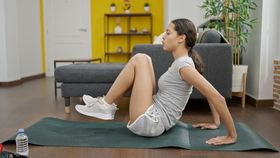Can Arthritis Knee Pain Radiate Into the Calf?
If you have arthritis in your knee, the pain in this area may be affecting your quality of life. But can the pain radiate into the calf? Find out here.
Published January 11, 2023.
Arthritis is characterized by chronic inflammation of joints, with the main symptoms including swelling, tenderness, pain, and stiffness. Just like arthritis can affect people in their 20s even though it's more common in older people, any joint can be affected by the disease even though it's particularly common in the knees.
However, the pain doesn't stay only in the knee area—arthritis knee pain can often radiate into the calf, resulting in a wider area of pain.
» Lubricated knee joints hurt less. See what foods aid knee lubrication
How Arthritis Causes Calf Pain
There are many types of arthritis, but osteoarthritis is the most common one. It causes stiff joints, muscle spasms, and leg cramps, and can even lead to immobility in severe cases.
In osteoarthritis, the cartilage in your knee joint breaks. As this is the cushioning between the bones in the joints, they start rubbing against each other, causing swelling and inflammation. There's added strain on the muscles and tendons in the area, and the pain eventually radiates to the legs, thighs, calves, hips, buttocks, and feet.
Leg cramps manifest as sharp, sudden contractions or tightening of the muscle in the calf, which can last for a few seconds to a few minutes. The typical symptoms are heaviness, numbness, or soreness in the leg muscles, which may be reduced to some extent by taking muscle relaxers.
Arthritis can also cause a Baker cyst, a condition in which the knee produces too much fluid. If the cyst bursts, the fluid can leak into the calf below, resulting in reddening, swelling, and severe pain.
How to Manage Calf Pain
Some of the effective measures to manage arthritis-related calf pain include:
- Doing light calf muscle stretches for muscle strengthening and improving flexibility
- Taking sufficient rest
- Drinking plenty of water, as dehydration contributes to muscle spasms and staying hydrated helps flush the toxins out
- Wearing comfortable shoes
- Reducing excess weight to lessen the strain on the joints
- Incorporating a nutritious diet to provide the right nutrients for joint healing and boosting collagen.
» Natural arthritis remedies: see the vitamins that reduce joint pain and inflammation
Reduce Knee & Calf Pain With the Right Help
With arthritis, the area in or around a joint becomes inflamed and causes pain, stiffness, and swelling. If you have arthritis in your knee, the pain may radiate from the knee to the calf.
Although arthritis can’t be cured, its symptoms and pain can be managed by following a healthy lifestyle, reducing excess weight, doing regular exercises, and wearing proper shoes. Managing arthritis pain will help improve your quality of life, especially if you also incorporate an effective supplement for arthritis like Heal-n-Soothe.
Make sure to seek medical attention if your knee hurts, feels warm to the touch, or your skin looks red, as these may be signs of infection that require additional treatment.
» Manage arthritis knee & calf pain by avoiding the wrong foods for arthritis




